As the U.S. government ratchets up a new Cold War, Poland is taking hostility toward Russia to the next level, inviting in U.S. military bases and arresting an anti-NATO politician on vague “espionage” charges, writes Gilbert Doctorow.
By Gilbert Doctorow
Since Poland’s right-wing Law and Justice Party returned to power last fall, the new government has been cracking down on independent media, reshaping the judiciary, and escalating its anti-Russian (and Euroskeptic) rhetoric. Now, it has arrested a leading critic, who has challenged its aggressive posture toward Moscow, on vague “espionage” charges.
The government’s infringement on press and political freedoms brought a rebuke this week from the European Commission, which accused Warsaw of endangering the rule of law. The complaint raised the possibility of sanctions, including depriving Poland of its voting rights on passage of European Union laws. That also could mean cutting off some generous E.U. financial aid for Polish infrastructure projects.
However, even as the E.U. expresses growing concerns about the authoritarian actions of the Law and Justice Party, there has been a warming of relations with the United States, particularly in the area of military cooperation.
Poland has pleased the U.S. government by joining in the scare-mongering over supposed Russian imperial designs on the Baltic States and Eastern Europe and by helping to persuade NATO to invest men and equipment in quasi-permanent military installations on Polish soil.
The construction of an American missile defense radar center with ballistic and other missiles is proceeding apace, turning the country into a U.S. bastion and potential launch platform against Russia in possible violation of existing agreements governing intermediate-range nuclear weapons.
While it’s true that the anti-Russian policies of the Law and Justice government are only marginally more aggressive than those of the Civic Platform government that it replaced, that’s because both reflect the majority views of Poland’s political elites. But other views do exist, including a minority opinion that NATO compromises Polish sovereignty and that good relations with Russia, as well as with the E.U., are in the country’s interests.
A new twist, however, is how the new government has gone to greater lengths to suppress dissent. Mateusz Piskorski, an outstanding spokesman of the minority view and founder of the Zmiana (or Change) party, was arrested last week in Warsaw on unspecified espionage charges.
While that bald fact was picked up by Western media, little or nothing has been written about the context of the arrest, namely its connection with the forthcoming NATO summit in Poland in July. Still less has been said about how the expanding U.S. influence – with Poland eagerly enlisting in the cause of the new Cold War – is putting Polish freedoms in jeopardy.
During a visit to the European Parliament on May 30 to participate in a closed conference, Zmiana National Board Member Janusz Niedzwiecki cast light on these chilling developments in a speech, which I cite in full below:
Poland’s Political Repression and Militarization
By Janusz Niedzwiecki, National Board Member, International Cooperation, Zmiana
I would like to begin by quoting a famous poem written by Pastor Martin Niemöller, the German anti-Nazi theologian:
“First they came for the Socialists, and I did not speak out—
Because I was not a Socialist.
Then they came for the Trade Unionists, and I did not speak out—
Because I was not a Trade Unionist.
Then they came for the Jews, and I did not speak out—
Because I was not a Jew.
Then they came for me—and there was no one left to speak for me.”
Although it might seem overstated, the situation described in Niemoller’s poem is beginning to take shape in Poland. A country which was considered for many years as a symbol of the fight against totalitarianism and pioneer of democratic reforms in Central and Eastern Europe is today quickly being transformed into a tyrannical satrapy where civil liberties are curtailed and repression is applied to people with different ideological views than the prevailing political narrative.
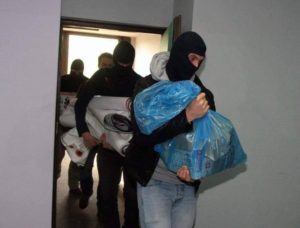
Polish Internal Security police carrying out a raid on the offices of the Zmiana (Change) party on May 18, 2016.
On the morning of May 18, 2016, officers of the Polish Internal Security Agency (ABW) searched apartments of members of the national leadership of the Zmiana (Change) Party, demanding that they hand over hard-disks, memory sticks, documents etc. The search took place in three different cities at the same time, and in some cases (as in our Warsaw office) with a serious violation of legal procedures.
Besides seizing computers, telephones and hard drives, ABW officers took all our books, leaflets, posters, the sound system we used during a demonstration, banners our party flags and even Polish national flags – to prevent and complicate any political actions and protests in the future. Some members of our party who did not want to participate in the unlawful activities of the Internal Security Agency were intimidated.
This type of action is an obvious form of a political repression against those who hold different visions of Poland’s foreign, domestic and socio-economic policies than those of the Polish neoconservative and pro-NATO authorities.
Arrest of an Anti-NATO Dissident
The leader of Zmiana, Mateusz Piskorski, affiliated organizations and independent groups were acting in conformity with Polish law in spite of harassment from state institutions, such as prolonged registration procedures of the party. The action of the ABW was a significant breach of law and order which is not acceptable in a democratic state that declares respect for the freedom of speech.
Mateusz Piskorski is one of the most important anti-NATO activists in Poland, a political expert and a co-founder of the Polish think-tank, the European Center for Geopolitical Analysis. He was a Member of the Polish Parliament from 2005-2007 and for many years he has spoken out in favor European-continental cooperation and against the NATO and American policy towards Europe and the Middle East.
Mateusz Piskorski was arrested and is being held for three months of preliminary custody on charges of “spying for a foreign country,” with various media sources hysterically spreading the “unconfirmed reports” that he was employed by the intelligence services of Russia, China “and/or” Iraq.
Specific charges are unknown, the whole case is being kept secret, thereby preventing anyone related to Mateusz Piskorski from preparing a defense. Instead, the government-controlled media have made a spectacle of hatred and slander, spinning irrational speculation, not only about the detainee but also about so-called “agents of the influence” – a term that de facto covers everyone who proclaims views other than those set down by the Polish authorities.
The wide-scale coordinated action against the Zmiana political party comes on the heels of an increasingly tense political situation in Poland. Several weeks ago, activists from the Communist Party of Poland and the Grunwald Patriotic Workers’ Union (both organizations are fully legal) were sentenced to “restricted liberty,” including community service, fines, and travel bans for “promoting totalitarianism.”
Following these events and just two days before his arrest, Piskorski warned that the Polish government will attempt to “pacify” opposition organizations and individuals in the run-up to the NATO summit to be held in Warsaw on July 8th-9th.
Pikorski’s Warning
Let us quote this text from Mateusz Piskorski which turned out to be prophetic:
“Predictions concerning the upcoming NATO summit in July in Warsaw are beginning to clearly indicate that today the alliance’s goal is first and foremost preventing the emergence of social movements demanding the liberation of Europe from the tutelage of the United States. As can be seen, The Financial Times’ inadvertent mention of the words of one of the Polish Army’s senior commanders show just what decisions can be expected this summer.
“These are decisions which completely undermine not only the sovereignty of Warsaw in the field of foreign policy, but also clearly speak to the fact that from this moment on NATO is supposed to be a police force ready to participate in the pacification of eventual social protests or intervene in the affairs of domestic Polish politics.
“The actual intentions of the alliance’s latest decisions were revealed honestly and in a frankly military way by Brigadier General Krzysztof Krol, the commander of the Multinational Corps Northeast. The issue under consideration was the concept of the so-called NATO spearhead advocated for years by the Americans and longed for by the Polish politicians of both the former and current government.
“Let us give the floor to the general: ‘The VJTF (Very High Readiness Joint Task Force) is to deal with Article 4 situations [of the North-Atlantic Treaty] and that is our intention with it.’ “Article 4 speaks of cooperation and consultation between member states which cannot be described as in article 5 as experiencing armed aggression against any of them, but rather subjective feelings of para-military threats.
“What kind of situations are we dealing with here? General Krol leaves no doubt: ‘The plan was developed to react to hybrid threats in our area of operation. Our plans are scalable to the situation,’ he told The Financial Times.
Repression Excuse: ‘Hybrid War’
“The concept of ‘hybrid war’ or hybrid actions has blossomed as a definition of the activities of Russia following the Ukrainian revolution of 2014. But what is interesting is that to this day it has not attained any unambiguous academic interpretation and various authors and experts define its scope in different ways. In The Financial Times, however, we read that the NATO spearhead has the right to take action in case of the destabilization of the international situation in the country triggered by, for example, public protests.
“What does this mean in practice? Any internal disturbance could be treated and presented by native as well as American ‘spearheadologists’ as part of the activities vaguely defined as ‘hybrid war.’ This might lead to a case in which protests against the effects of the TTIP Agreement supported by the Polish state could be treated as ‘hybrid activities.’ Poles’ protests against crimes committed by US Army soldiers stationed in Poland could also turn out to be ‘hybrid war.’
“Antoni Macierewicz’s sick imagination could suggest dozens of different theories. After all, the current Defense Minister is so divorced from common sense that he believes that Radoslaw Sikorski, another pro-American hawk, is actually working for Moscow.
“Social unrest, protests, strikes, attempts to form information resources independent from the establishment, demanding transparency in the defense and foreign policies of the Polish authorities – all of these could become pretexts for one or another swing into action of advisors from NATO (mainly from the USA), who would provide ‘fraternal aid’ to the Polish units and services subordinated to them.
“In this situation, all that is left is to hope that officers and officials will not want to stay in an ‘oral relationship’ (the colorful expression of Sikorski) with their American overlords, will remind themselves of the dignity of the Polish uniform, and send all those representatives of foreign interests ‘concerned about our security’ far back across the Atlantic Ocean.
“Meanwhile, we have been left with one thing: to loudly protest and by all law-abiding means block the realization of NATO’s plans which it will announce in July in Warsaw. It is also worth organizing a social movement for Poland’s exit from this pact as a condition of regaining elementary statehood.” [End of Piskorski’s comments.]
Pre-War Prep
So what is actually going on in Poland, and how could it be connected with the pre-war preparations?
First of all, our biggest concern should be to highlight the fact that in parallel with the political repressions inspired by pro-NATO circles (unprecedented since the fall of the Berlin Wall), there is a huge wave of militarization and Russophobe, pro-war rhetoric.
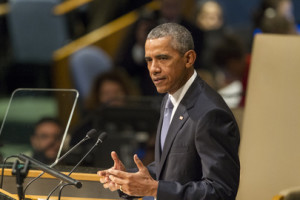
U.S. President Barack Obama addresses the United Nations General Assembly on Sept. 28, 2015. (Photo credit: United Nations.)
Polish neoconservative authorities have not only significantly increased military spending and created new types of troops and paramilitaries, but also begged for the presence in Poland of U.S. troops and military installations.
After Antoni Macierewicz (who was previously head of the para-committee ineffectually trying to reject the official version of the Smolensk disaster, so that they could blame for the incident on Vladimir Putin) was appointed as a Minister of Defense, not only was decision taken to allow the creation of a US base for ballistic missiles (an element of the so called “anti missile shield”), but also to create six U.S. military bases. To calm public opinion in the media they are called “warehouses of military equipment”.
The definition of “hybrid war” was extended to the limits, so that any action differing from the line drawn by the official propaganda may be regarded as hostile in not only political but also military terms. Thus the proclamation of ideas contrary to the official propaganda is openly called by government run media as “inspired by foreign intelligence services.”
Another important issue is the fact that Poland was one of the few countries in Europe to officially support the aggressive version of TTiP advocated by the U.S. government. This can be read as a direct involvement of the Polish authorities in sabotaging a competitive project – the New Silk Road – run by China.
As if all this were not enough, Polish President Andrzej Duda a few days ago signed a law which equates the rights of American troops stationed in Poland with the rights of the Polish Army. They can thus move freely around the country without having to consult the government about their current activities. It is worth mentioning that such privileges were not available even to Soviet troops formerly stationed in Poland, who were forced to remain in their bases at all times.
Overall, the situation in Poland is tense and in many ways resembles the changes that have occurred in Turkey during the rule of Erdogan. This combination of authoritarianism, militarism and political repression has to be worrisome, because it is a typical mix of measures taken by authorities that are preparing for war. Taking into account the geopolitical conditions of Poland under every possible scenario such a war has to end tragically. [End of Niedzwiecki’s speech.]
Gilbert Doctorow is the European Coordinator of The American Committee for East West Accord Ltd. His most recent book, Does Russia Have a Future? was published in August 2015. © Gilbert Doctorow, 2016

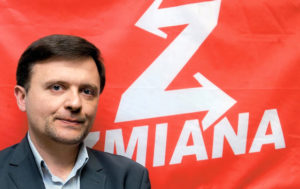
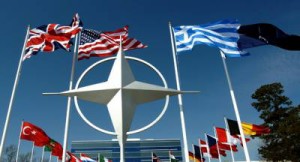
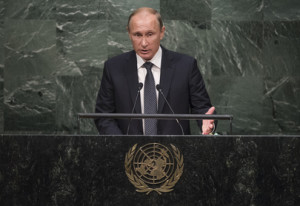
Ah, more western style “freedom and democracy” or is it freedumb and demockery?
“the new government has been cracking down on independent media” That’s not true. the media weren’t independent, they depended on the parties that lost the elections that is Civic Platform and Peasant Party.
I recogn that the start of confrontations will be rather modest in the form of blockading the Kaliningrad Oblast (the Russian exclave located between Lithuania and Poland) so that it can only be reached by sea or air from Russia proper. The propping up of military and US troops in Poland and the Baltics, the approach of US Navy vessels to less than 100 km’s from the Kaliningrad Oblast and the pressure on Sweden to join NATO point in that way. In order to avoid a full scale invasion of the Oblast, Russia could try to supply Kalinigrad via sea and air by civil merchant vessels and aeroplanes in order to not give NATO the excuse “they attacked”. It would not surprise me if such a blockade would coincide with Hilary Clinton’s election campaign (just like McCain tried to exploid the Georgia crisis for his means) against Trump because she could use that as an example of Trump’s “naivety” towards Russia. But what needs to be found before is some kind of “Sender Gleiwitz” (The Nazis claimed that Poland attacked this German radio station in 1939 triggering the German invasion) szenario in order to justify the blockade. What will be put on the table for Russia in order to have the blockade lifted is the return of Crimea to Ukrainian authority, perhaps an ultimatum will also be attached. The next step could be full scale “liberalisation” of the Kalinigrad Oblast and here the current Polish government and Lithuania can probably hope for a chunk of it been given under their administration. Unless, this will trigger a full scale nuclear confrontation…..
After bringing Ukraine to the stage of complete disintegration, the country has fallen into mired corruption, ruled by oligarchs and extremist groups. This all brings Ukraine towards the final steps of ‘democracy’ and closer EU and NATO structures. Namely, it changes Ukraine into an open mafia territory where one of the primary forms of trade is selling weapons (about 2 million weapons have recently been acquired by the Ukrainian Maidan extremists) to ISIS cells in Western Europe. Poland at this stage will be the territory of smuggling routes and logistics. Paradoxically, precisely because of being a smuggling route, Poland will be able to enjoy, for as long as possible, relative calm since groups of terrorists smuggling weapons from Ukraine will not want to be noticed by local intelligence services in Poland.
Poland: A New Route for ISIS Weapons Smuggling Operations?
By Konrad Stachnio
http://journal-neo.org/2016/04/18/poland-a-new-route-for-isis-weapon-smuggling-operations/
Loser!
YMOAT:
Perhaps you will find this article of interest. The article’s length may be a challenge for you, but you will get the essential point from the introductory paragraph. “Caught red-handed: Secret Tape Reveals US-backed Plot to Topple Ukraine’s Democratically-Elected President” by Mike Whitney – http://www.counterpunch.org/2014/02/12/caught-red-handed/
You might take some comfort in noting that your proclivity for profanity would not necessarily exclude you from employment in the state department..
There are good reasons for Poland to favor good relations with Misha. Poland, as in the past over the centuries, will be be squashed like a roach in any low yield nuclear exchange with Russia, while NATO goes into “I’ll hold your coat while you and he fight” mode with us.
I would like to add to Dr Doctorow’s article that what he describes, the surpression of democracy, is not unique to Poland. In any candidate or new NATO member country of Eastern Europe in which there is a trace of opposition to NATO the regime appointed by US through “democratic elections” cracks down on opposition media and demonstrations. The US and its EU puppets usually issue some pro-forma criticism and privately congratulate the servant government. The situation in the new part of NATO is very similar to what it was like under the Warshaw Pact: whilst the old rhetoric was about the non-existent progress of proletariat the new rhetoric is about non-existent democracy. If anyone is interested, I will provide a few examples of the new “democracy” in action from other countries.
Whilst Russia appears to have moved on from the times of the Soviet Communism, the Eastern Europe is still stuck in the Cold War, only under the new masters. Is not that a huge irony!
So YMOAT,
how many military bases does the “aggressive” Russia have around the World?
One or two, compared to, 800+ of the truly aggressive Imperialist American Hegemons.
And can I suggest you take a few hours to Google what really happened in Ukraine, Georgia, and Others(?).
Posted on the Information Clearing House Blog yesterday:
“There is no objective reason why US and Russia should consider each other adversaries. The current confrontation is entirely the result of the extremist views of the neoconservative cult, whose members were allowed to infiltrate the US Federal government under President Bill Clinton, and who consider any country that refuses to obey their dictates as an enemy to be crushed. Thanks to their tireless efforts, over a million innocent people have already died in the former Yugoslavia, in Afghanistan, in Iraq, Libya, Syria, Pakistan, the Ukraine, Yemen, Somalia and in many other countries—all because of their maniacal insistence that the USA must be a world empire, not a just a regular, normal country, and that every national leader must either bow down before them, or be overthrown. In Russia, this irresistible force has finally encountered an immovable object. They must be forced to back down before they destroy us all.”
Even us idiots understand this.
It appears YMOAT has bought the propaganda hook, line, and sinker. The neocons are going to destroy the planet and I wish there was something to do to stop them. What’s been being done certainly isn’t working.
Eastern Europe was ‘different’ from Western Europeans
E. europeans were ‘outsiders’
https://en.wikipedia.org/wiki/History_of_Poland
(every argument/debate – begins w/a framework.)